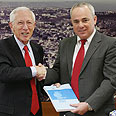
Israel's central bank chief said Wednesday that not only has his country weathered the global economic meltdown – its growth this year will exceed his own forecast.
Presenting his annual report on Israel's economy, Stanley Fischer predicted the country's economy would grow 3.7% this year, up from his previous prediction of 3.5%. He also forecast unemployment would fall to 7% this year, down from 7.4% in 2009.
Fischer noted that in contrast to the slumping US and European markets, Israel experienced slight economic growth last year. He credited Israel's strictly supervised banking system with limiting the scope of the crisis that devastated Western economies.
Last month, Fischer, a former senior official at the World Bank and International Monetary Fund, agreed to serve a second five-year term as governor of the Bank of Israel.
He has been credited with moving early to cut interest rates and intervening in the currency market to protect the local export sector.
With the economy recovering, Israel last year began raising interest rates – making it the first country to take such a step toward post-recession stabilization.
But the governor, who was once head of the department of economics at the Massachusetts Institute of Technology, said the work here is not yet done.
"We have challenges for the future. We will have to draw conclusions from what happened in the crisis, to create plans for economic growth," Fischer said.
Peres: Israel stronger, more prosperous
Fischer formally presented his annual report on Wednesday to President Shimon Peres and Prime Minister Benjamin Netanyahu, both of whom commended him for stabilizing the economy.
"Israel has emerged from the crisis stronger and more prosperous than before it," Peres said. "The economic improvement has lifted national morale and improved the welfare of the residents of Israel."
But some economic analysts in Israel fear the numbers may be misleading, noting that Israel's overall standard of living has not risen, while its poverty rate and economic inequality have grown. Analysts also warn of a real estate bubble burst on the horizon.
Dan Ben-David, an economics professor at Tel Aviv University, said Israel's long-term economic prosperity depends on the quality of education for its Arab and ultra-Orthodox Jewish communities – the country's fastest growing and least educated sectors.
"If they receive poor education, they are going to find it hard to take part in the modern work force," he told The Associated Press. "There is a big cloud on the horizon that we can fix."
Fischer acknowledged that Israel has to cope with widening social gaps.
Before moving to Israel in 2005 to head the central bank, Fischer held top posts at Citigroup, the World Bank and the IMF, where he worked on resolving financial crises in Mexico, Russia, and Southeast Asia during the 1990s.
Fischer, 66, who was born in North Rhodesia, now Zambia, also served as the thesis adviser to US Federal Reserve Chairman Ben Bernanke at MIT in the 1970s. He has been promoting Israel's bid for acceptance into the Organization for Economic Cooperation and Development, a grouping of 30 of the world's richest nations.















